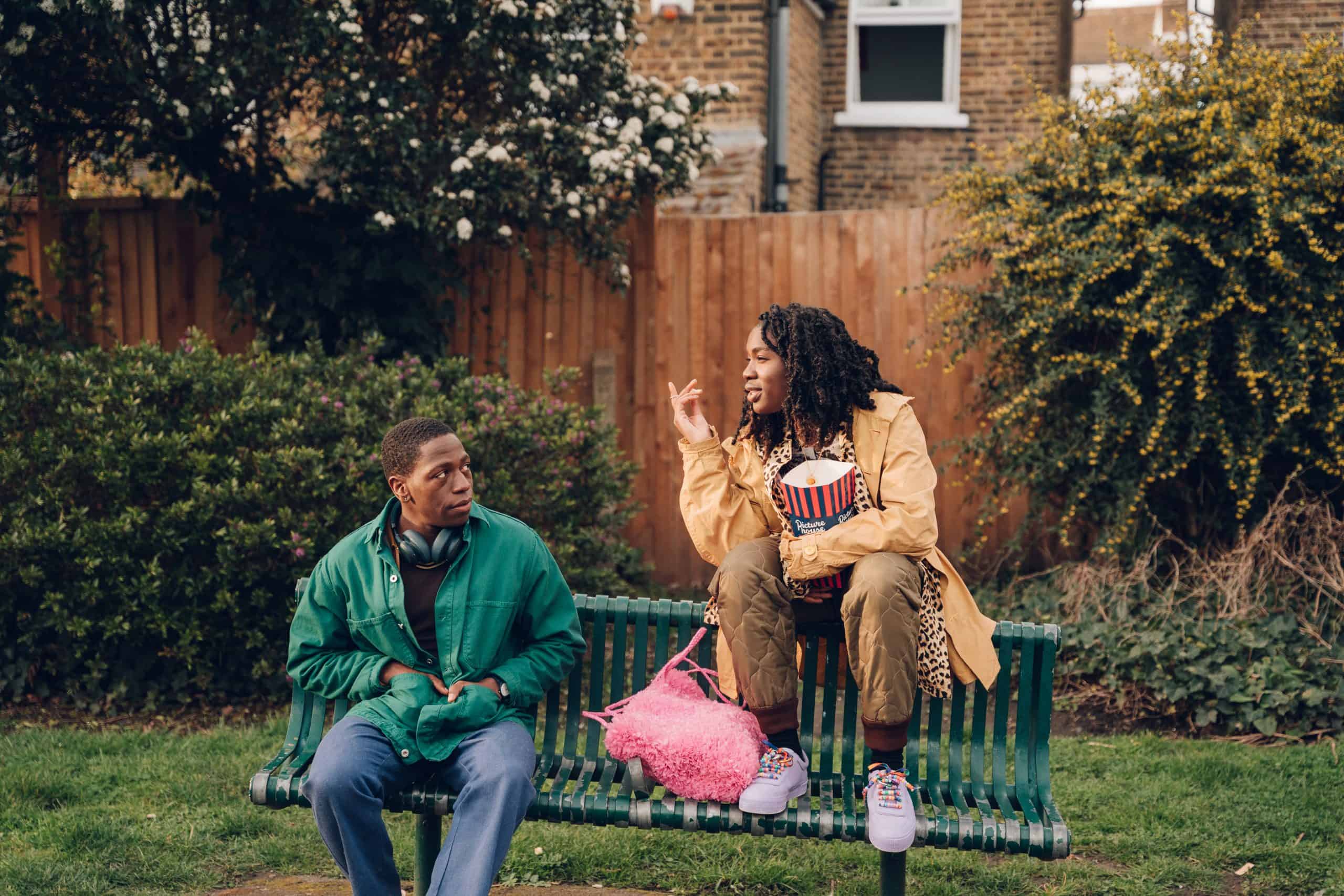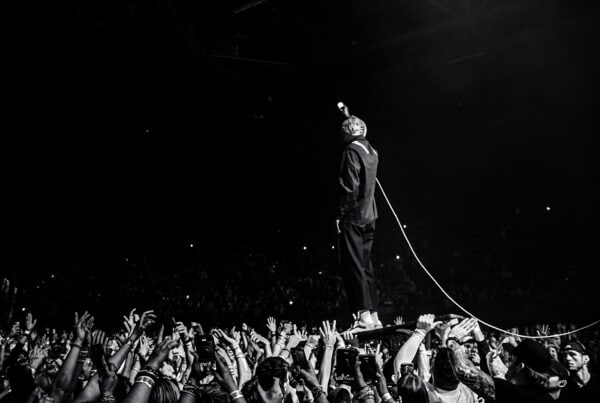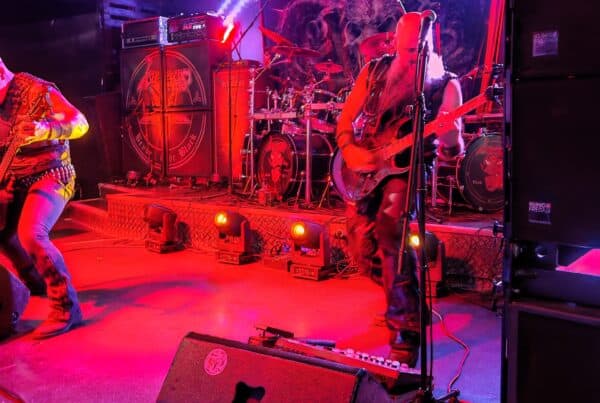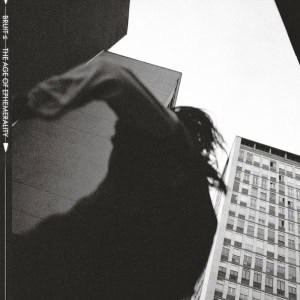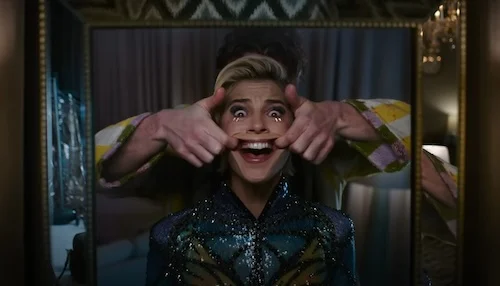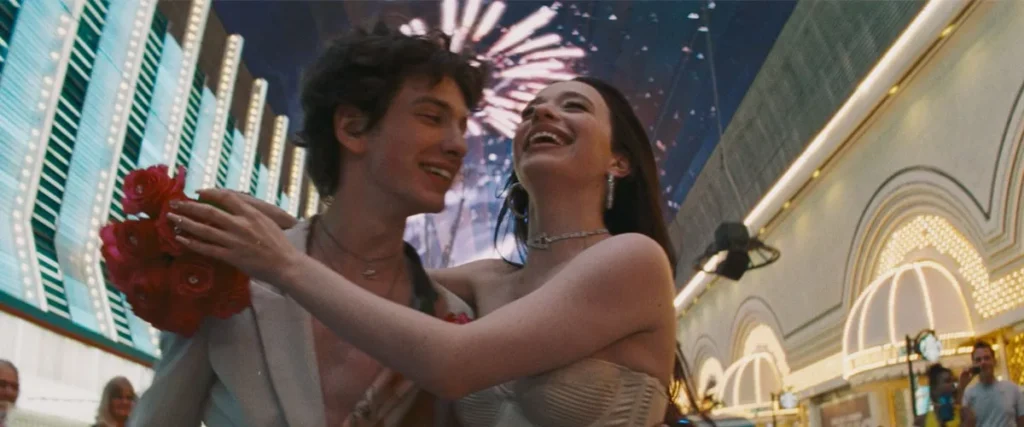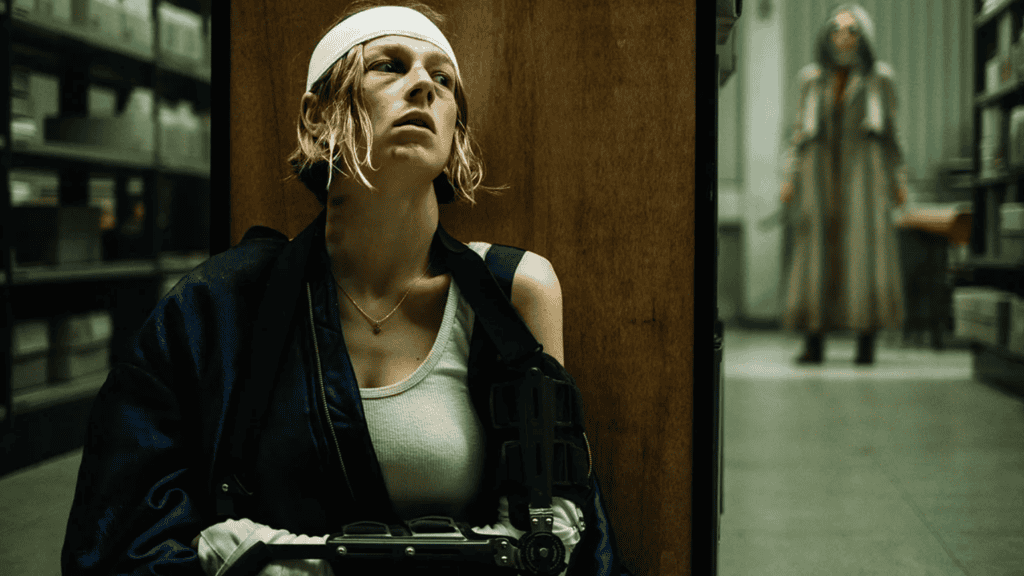Note: this review was made possible thanks to a screener provided by the film’s UK distributor, Searchlight Pictures.
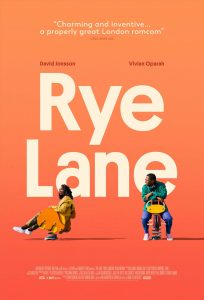 Over the last half-decade, we’ve been in the midst of a proper rom-com resurgence. A theatrical staple since the medium’s earliest days, one could argue their popularity hit a peak from the mid-90s through to the mid-00s. If you reading this think of a rom-com, you’re almost definitely thinking of Richard Curtis and Nora Ephron scripts, Kate Hudson and Hugh Grant top-lines; the meet-cute and the third-act break-up and the climactic dash through the airport; When Harry Met Sally, You’ve Got Mail, The Wedding Singer, 10 Things I Hate About You; the works… A combination of a glut of subpar features with ballooning budgets and the gradual decline of comedies in the theatrical space – particularly as it pertained to non-English-speaking markets where the comedy and romance dynamics don’t translate so well, and which Hollywood started to put all their eggs into as the 2010s dug in – would ultimately see the genre put on life-support. (Not coincidentally, this’d be the period where Hollywood entered its heatless chastity era from which we are yet to emerge, but that’s a rant for a different time.)
Over the last half-decade, we’ve been in the midst of a proper rom-com resurgence. A theatrical staple since the medium’s earliest days, one could argue their popularity hit a peak from the mid-90s through to the mid-00s. If you reading this think of a rom-com, you’re almost definitely thinking of Richard Curtis and Nora Ephron scripts, Kate Hudson and Hugh Grant top-lines; the meet-cute and the third-act break-up and the climactic dash through the airport; When Harry Met Sally, You’ve Got Mail, The Wedding Singer, 10 Things I Hate About You; the works… A combination of a glut of subpar features with ballooning budgets and the gradual decline of comedies in the theatrical space – particularly as it pertained to non-English-speaking markets where the comedy and romance dynamics don’t translate so well, and which Hollywood started to put all their eggs into as the 2010s dug in – would ultimately see the genre put on life-support. (Not coincidentally, this’d be the period where Hollywood entered its heatless chastity era from which we are yet to emerge, but that’s a rant for a different time.)
But in the late 2010s, as streaming services (and specifically Netflix) started pumping out original content, the rom-com found a surprising renaissance. Perhaps because the genre is tailor-made for comfort movies, the kind that one really enjoys watching even if they’re unlikely to pay inflating cinema prices to do so, a boom of rom-coms sprung forth. The To All the Boys I’ve Loved Before trilogy, Always Be My Maybe, Someone Great, The Kissing Booth (if you have no standards) were all massive hits and a panacea to those, like me, who never stopped loving this subgenre. Perhaps relatedly, the new crop of rom-coms have presented more diverse faces both in front of and behind the camera, refreshing old tropes with new insight and prospective stars than the genre previously welcomed.
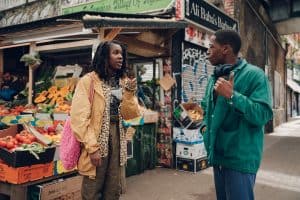
Photo Credit: Chris Harris; © 20th Century Studios.
The unfortunate flip-side, however, has been the fact that, aside from 2018’s Crazy Rich Asians (and who knows if that’ll stay afloat should they ever manage to get the sequel together), this popularity spike hasn’t translated to theatrical rom-coms. It’s not entirely for lack of trying on the studios’ part. The Broken Hearts Gallery was great but got released in pandemic purgatory, Bros tried to revive the Apatow rom-com but make it queer, and the throwbacks of The Lost City and Ticket to Paradise (the latter reuniting two of the biggest names of the genre in George Clooney & Julia Roberts) both made a decent amount of money. But it’s still been an inconsistent crap-shoot in getting audiences to pay money for rom-coms in the cinema, even when they turn out to be some of the year’s best films whether you’re a rom-com cultist or not.
Which brings us to Rye Lane, making its debut on Disney+ this week despite opening in cinemas barely even six weeks ago. The two facts are perhaps intertwined and that’s a major shame because Raine Anne-Miller’s debut feature will likely go down as one of the best movies of 2023. I know that’s a bold claim to be making when the first four months of the year have already provided stiff competition for the crown – John Wick: Chapter 4, A Thousand and One, How to Blow Up a Pipeline, and Blue Jean just for the non-holdovers. But it is rare as hell for me to sit through a movie with a consistent smile as brightly beaming as I did here. Rye Lane is living testament to the pure popcorn power of the romantic-comedy, how relentlessly joyful and charming and escapist they can be whilst still tapping down into something truthful and insightful about ourselves.
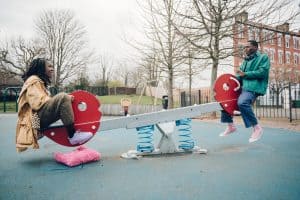
Photo Credit: Chris Harris; © 20th Century Studios.
The elevator pitch can be boiled down to “what if Before Sunrise was set in South London and loosened up more than a tad.” This is the rom-com stripped to its barest essences, just a boy and a girl hanging out together over the course of 24 hours and discovering there may be something between them that completes the other. The boy is Dom (David Jonsson), an accountant pushover still reeling three months on from his girlfriend of six years cheating on him with his best mate. The girl is Yas (Vivian Oprah), a headstrong wannabe costume-designer relatively fresh off her own break-up with a dickhead artist she dumped. They meet when she overhears him sobbing loudly in the toilets of a mutual friend’s (terrible) art exhibition and, bonding over their shared heartbreak, end up trawling the streets of Brixton & Peckham slowly getting to know each other, working through their hang-ups, and radiating enough sparks to power South London by themselves for an entire month.
Any conversation is going to naturally focus around Jonsson and Oprah first and foremost. That’s a given in a two-hander like Rye Lane, but it’s a task that both leads are more than up to. Oprah’s most likely to steal all of the attention by virtue of her being over-encumbered by mega-tonnes of ever-flowing charisma, somehow always having the exact right side-eye or wry line delivery or ineffable presence for whatever Nathan Byron and Tom Melia’s super-witty screenplay throws at her. You can tell within seconds that Yas is the kind of woman who dominates a room, steamrolling over reticence and arseholes whilst still being partly attentive to other people’s feelings, likely as a mask for her own insecurities. The well-drawn characterisation forms that base, but it’s Oprah who brings it all fully to life. If I didn’t have a dreadful history of cursing anyone whom I do this for, I’d be investing heavily in her stock right about now; she should be a Star.

Photo Credit: Chris Harris; © 20th Century Studios.
Which is not to say that Jonsson isn’t holding up his end of the bargain. Just that, by design, his is a more passive and reactive role than hers. Dom is the kind of guy who willingly continues to be best friends with the guy who stole his girlfriend, blaming himself entirely for the dissolution of a relationship he’d instinctually avoided all red flags for, and tries for grand gestures that blow up in his face like booking out the chicken shop of his first date for their anniversary. He wants to be more assertive and move back out of his parents’ house – naturally, he didn’t get to keep the flat in the breakup – but he’s incapable of conflict or trying new things. Almost like a small sad puppy energy and Jonsson makes all of that massively endearing. It feels like a debut film performance (which it is), but not in a bad way; the youthful naivety, hope, and sparkle in his eyes feed into everything, particularly as the day goes on.
Together, both actors make a perfect pair. The rhythm of their rapport, aided by Victoria Boydell’s airtight editing, is the kind of stylised naturalism you see in many a great rom-com where it feels like two friends “yes, and”-ing each other’s sentences. Each actor bringing out something more in their partner, held-gazes that practically sizzle with anticipation, and a relaxed honesty that betrays how badly they want to be able to trust again in spite of the pain that follows rejection. Within minutes, I was rooting for Yas and Dom to get together and the dance that gets us to the climactic point is enthrallingly sweet to watch unfold. Efforts to get back at their exes, Yas trying to help Dom expand his horizons, Dom breaking through Yas’ armour to find the more vulnerable side underneath, and a karaoke scene that’s by turns masterful cringe comedy and wonderfully romantic.
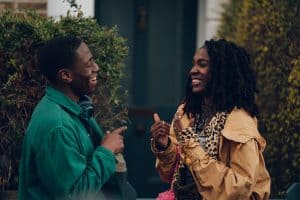
Photo Credit: Chris Harris; © 20th Century Studios.
Raine Allen-Miller wisely entrusts her performers to be the stars of the show, but she’s working overtime behind the camera to give them the energy to feed off of. Alongside cinematographer Olan Collardy, her vision of South London captures the vibrancy and community of the area, walking the fine line of being cinematic without coming off as touristy. Bustling markets, carefully-tendered parks, playground swing sets, and auntie cookouts in backyards all burst with bright colour and a kind of fairy-tale romanticism. Allen-Miller and Collardy almost exclusively use wide-angle lenses for this very purpose, slightly heightening the reality of these places in order to make everyone see South London like native Brixton-ers do.
There are also more openly stylish touches which put an additional personal stamp on Rye Lane’s visual language. Many conversations, particularly the more intimate ones, utilise POV shots of one party talking almost directly down the lens to a degree that reminds me of how Barry Jenkins fosters similar romantic intimacy. Fish-eye lenses are deployed to make certain streets and building walls look longer than they are, communicating a character’s anxiety. Lots of off-centre framing and blocking create strikingly-composed images that still feel full of life instead of perfume-ad studied, which the genre at large fell into hard in the mid-00s. Sometimes, Allen-Miller gets to construct fantasy flashbacks that add extra playful spice to the event Dom or Yas are relaying to each other, which both livens up potentially static scenes and lets us inhabit the brain of the person narrating the simplified story they’re fronting to the other person. (It helps that some of the film’s biggest laughs can be found in them, too.)

© 20th Century Studios.
I could go on, but I also feel like to do so would be to somewhat overstate what Rye Lane is doing here. More than anything else, Raine Anne-Miller’s film is perhaps the new go-to for whenever somebody wants to demonstrate why rom-coms are so appealing. In stripping the genre back to its foundations – which, by the way, includes the runtime; this is a lean 82 minutes – and executing those fundamentals with such zesty aplomb, Rye Lane becomes a non-stop joy machine. It’s immense fun to hang out with Yas and Dom, to exist in Anne-Miller’s vision of South London, to cackle at many of the exchanges and shenanigans they all get into, to witness two people who bring out the best in each other slowly realise their mutual attraction, to sympathise with the holes in their respective hearts from past disappointment…
Rom-coms are perhaps the broadest, most bleachers-playing type of movies around. They are concerned with big universal emotions almost everybody in the audience can relate to and operate in grand earnest swings that, should they connect, speak to the part of us all which, no matter how jaded, wants to believe storybook romance really is possible. Even more than four-quadrant blockbusters with bajillion-dollar budgets and CGI setpieces focus-tested to death in an effort to ensure maximum audience engagement, rom-coms aim for universal appeal and to send the entire audience home with a song in their heart and a spring in their step. Rye Lane proves the power that these movies can have, whether you’re a rom-com devotee (like I) or not. You likely missed it once. Do not miss it now.
Rye Lane streams on Disney+ from today.
Words: Callie Petch

